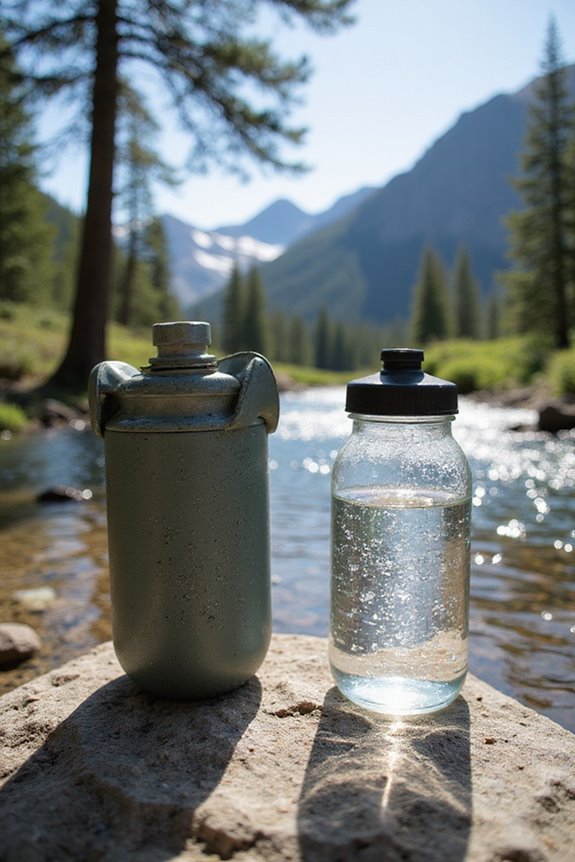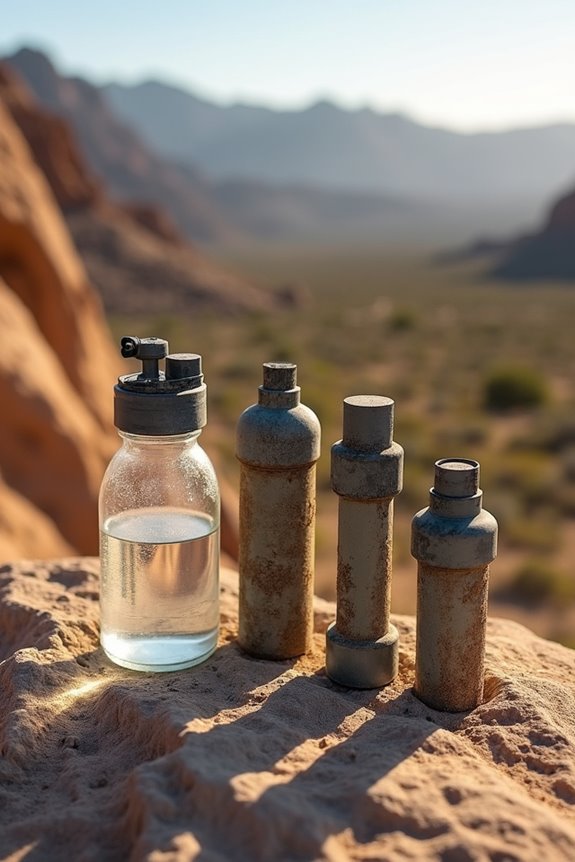When we hit the trails, picking the right water filter is key for staying hydrated and happy! We love carbon filters for removing bad tastes and odors. Don’t forget to check your filter’s pore size—0.1 microns is best for keeping those pesky protozoan cysts at bay! Regular maintenance is essential; a clean filter can save us from nasty surprises. Plus, we should always test our water quality. Curious about the best filters for our next adventure? Let’s explore this further!
Key Takeaways
- Assess Water Quality: Test your water to identify specific contaminants before choosing a suitable filter type.
- Choose the Right Filter: Opt for NSF-certified filters based on your water needs, including options like whole-house or under-sink systems.
- Regular Maintenance: Inspect and clean filters regularly, ideally every 6 months to 1 year, to maintain optimal performance.
- Consider Hidden Costs: Factor in installation, maintenance, and replacement expenses when budgeting for a water filtration system.
- Explore Outdoor Filters: For hiking, select filters with a pore size of 0.1 microns to ensure removal of harmful pathogens from natural water sources.
Understanding Different Types of Water Filters
When diving into the world of water filters, it’s essential to understand the variety of options we have at our fingertips! There’s nothing like knowing your water is clean, right? Let’s start with carbon filtration, where activated carbon traps nasty impurities like chlorine and bad odors—incredibly handy for our hiking adventures!
Next up is ion exchange, which swaps out unwanted ions like calcium for sodium, making hard water softer. Perfect for camping trips! But beware: it can skyrocket sodium levels in our drinking water.
For outdoor enthusiasts seeking reliable protection, look for filters with a pore size(0.1 to 0.2 microns) that effectively removes 99.9999% of bacteria and 99.9% of protozoa.
Choosing between these options empowers us to enjoy the great outdoors without worrying about what lurks in our water. Let’s stay hydrated and free, my fellow adventurers! Cheers to clean water and memorable trails!
Importance of Regular Maintenance
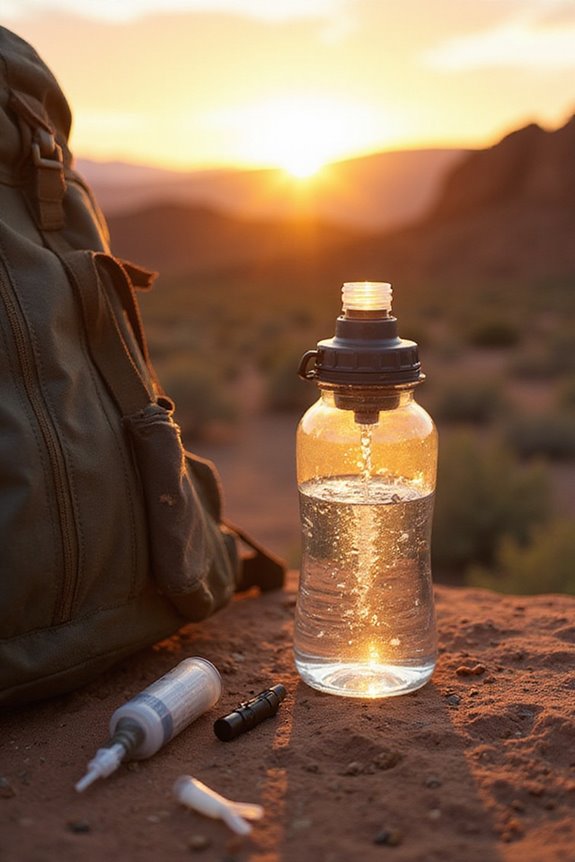
To keep our beloved water filters working like a charm, regular maintenance is a must—not just a nice-to-have! Trust us, it’s the secret sauce to extending our filter lifespan and ensuring crystal-clear water. We need to stick to a solid maintenance schedule; inspecting membrane filters every six months to a year can save us from headaches down the line.
And let’s not forget those pre-filters! Cleaning them is essential for efficiency. Regular check-ups, even by a pro, can catch issues early, preventing costly surprises later. Think of it like hiking—maintaining our gear makes all the difference! By giving our filters some TLC, we reap the rewards of clean water and a longer-lasting system. For best results, choose filters with 0.1 micron level filtration to effectively remove protozoan cysts and other harmful contaminants. Now, let’s keep that flow going!
Assessing Your Water Quality
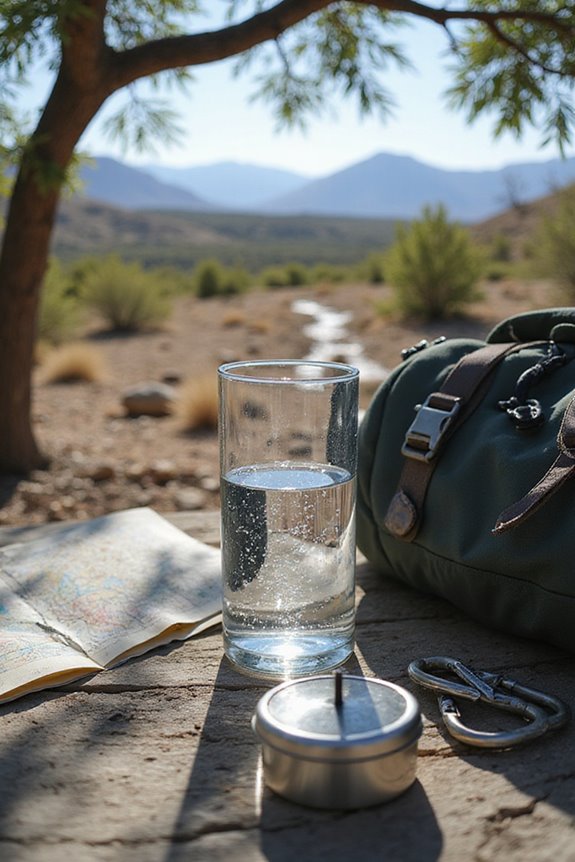
How do we even begin to assess the quality of our water? It’s as essential as packing the right gear for a hike! First off, we can explore water testing—think of it as a health check for our precious streams and lakes. We should consider potential contamination sources, like agricultural run-off or nearby factories, that might be sneaky intruders. Targeted monitoring can uncover hidden nasties, while biological indicators tell us how well aquatic life is holding up. And let’s not forget physical measurements—pH, temperature, and dissolved oxygen give valuable insights. So, let’s not just sip from the stream; let’s guarantee it’s safe! After all, every drop counts on our quest for freedom in the great outdoors! For guaranteed safety, invest in filters like the Sawyer Squeeze that remove 99.99999% of bacteria and 100% of microplastics from potentially contaminated water sources.
Choosing the Right Filter for Your Needs
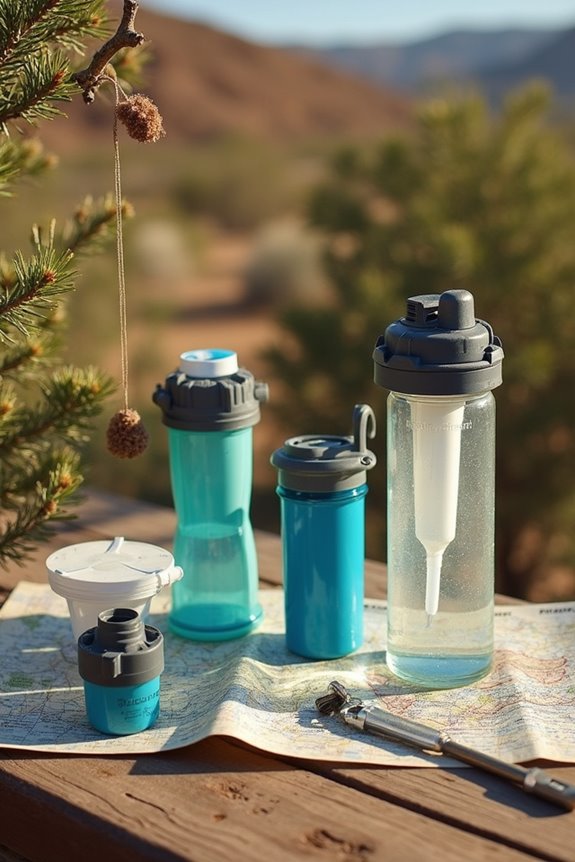
Ever wonder which water filter is best for your specific needs? Choosing the right filter types can feel like hiking up a steep trail. We all want that invigorating, clean water at the end! To guarantee optimum filtration efficiency, it’s essential to evaluate what contaminants are in your supply.
Are you battling lead or chlorine? A whole house filter might be your best bet! For quick fixes, check out countertop filters or faucet attachments. Meanwhile, if you’re after the gold standard, reverse osmosis systems are champs at removing heavy metals and germs.
Don’t forget to look for certifications; nothing says “trust me” like a filter that’s NSF-certified. For backpacking adventures, look for models with a 0.1 micron pore size that can eliminate 99.99999% of bacteria and 99.9999% of protozoa. So, let’s explore our options and savor the freedom of pure, glorious water!
Installation Tips for Optimal Functionality
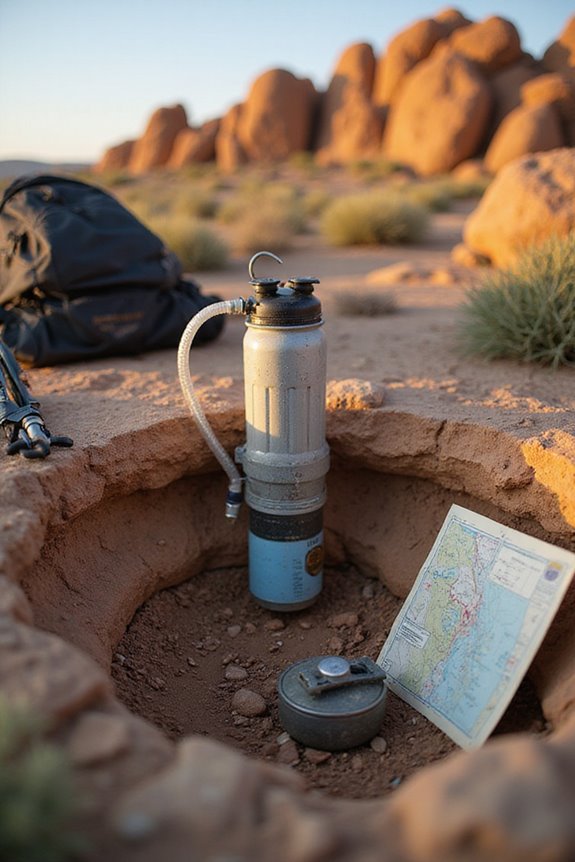
When we plunge into the world of water filter installation, some prep work makes all the difference! First, let’s chat about that all-important installation location. It’s essential to place our unit near the main water supply for ideal filtering and confirm it’s away from those damp, temperature extremes. We want easy access for maintenance too!
Now, onto tool preparation. Gather your screwdrivers, adjustable wrenches, and pliers—don’t forget the sealant tape for those threaded connections! It’s like packing for an adventure; we wouldn’t want to hit the trail without the right gear. Remember to backwash the filter before first use to ensure optimal taste and performance, especially with LifeStraw Peak Series models. Finally, always double-check that we’ve got all manufacturer parts ready to roll. Happy filtering, everyone—we’re digging into clarity, one drop at a time!
Overview of Costs and Budget Planning
While we all swoon over the prospect of crystal-clear water, diving into the costs and budgeting for a water filtration system can feel as overwhelming as climbing a rugged mountain trail! To start, let’s break down our cost assessment: whole-house systems can soar from $850 to $5,400, while under-sink filters are a friendlier $170 to $580.
When we plan our budget allocation, we need to keep in mind the hidden costs—installation and maintenance! Total expenses can rise with added filter replacements and labor fees. So, let’s not rush into this like we’re scaling a peak! We should evaluate our water needs and think ahead. A solid plan will help us enjoy that invigorating freedom of crystal-clear water without ongoing surprises!
Common Myths About Water Filtration Systems
Isn’t it wild how many myths surround water filtration systems? Let’s clear the air! First up, boiling water doesn’t magically zap all contaminants. It might handle some biological nasties but leaves chemicals lurking around—ouch! And not all filters are created equal; their effectiveness varies, targeting different impurities. So, choosing the right one is essential!
Now, just because water tastes fine, doesn’t mean it’s safe—many toxins play hide-and-seek without a taste or smell! Plus, water softeners and filters? They’re different tools in our purification arsenal. Softening won’t save us from harmful bacteria, folks!
Lastly, don’t be fooled—natural and bottled water isn’t always safe. Testing and filtration are our best pals for pure hydration adventures!
Frequently Asked Questions
Can I Use Multiple Filters Together for Better Results?
Absolutely, we can use multiple filters together for better results! Filter stacking enhances filtration effectiveness, but we should guarantee filter compatibility. This way, we enjoy cleaner water while maintaining a free spirit in our choices.
How Do Water Filters Affect Water Pressure?
Water filters can impact water pressure in various ways. Different filter types might restrict flow but can also prevent clogging, ultimately helping maintain pressure. We need to choose wisely for effective filtration and optimum pressure.
Are Water Filters Effective Against Viruses?
Imagine a sieve catching rocks while letting sand slip through. Unfortunately, most water filters aren’t efficient for virus removal. We need stronger purification methods to guarantee our water’s safe—freedom from illness is essential for our well-being.
Do Water Filters Remove Beneficial Minerals?
When we consider whether water filters remove beneficial minerals, it’s essential for our mineral balance and health benefits. Some systems do strip these minerals away, so we should choose wisely to maintain our well-being and hydration.
How Long Does It Take to Filter Water?
When we think about water clarity, filtering speed varies widely. A pitcher might take minutes, while a faucet filter’s almost instant. Let’s embrace our choices in filtration, ensuring we enjoy pure, invigorating water together!

